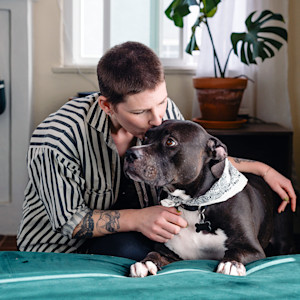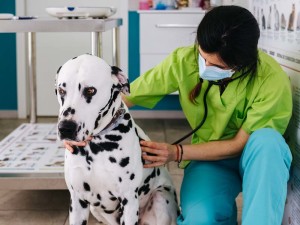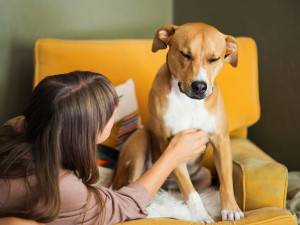What to Do if Your Dog Has an Upset Stomach
You just want to make it better.

Share Article
In This Article:
What Signs Show That Your Dog Has An Upset Stomach? What To Feed a Dog With an Upset Stomach Dog Upset Stomach Remedies Medicine for A Dog’s Upset Stomach
Nearly every dog will experience an upset stomach at some point. As a result, every dog parent has likely experienced at least one sleepless night with a restless pup, cleaning up accidents, and trying anything and everything to bring your dog some relief.
Upset stomachs can occur for many different reasons. Some treatments will be more effective than others for each dog’s specific situation. The good news is that most cases of upset stomachs resolve quickly and there are some helpful steps you can take to support your dog’s recovery.
What signs show that your dog has an upset stomach?
Upset stomach is a general term that pet parents may use to describe a number of different signs of illness. Some of the most common situations we see are dogs that suddenly develop vomiting and may vomit multiple times in a short period of time. This may be accompanied by other signs of illness including decreased appetite, increased gurgling sounds in their stomach, drooling, lip-licking, lethargy, pain, or diarrhea.

The underlying causes can also be variable and may include dietary indiscretion, or eating something they shouldn’t have, as well as infectious causes like parasitic, bacterial, or viral infections. Other times, an upset stomach can be related to stress, a change in diet, a reaction to medication, or a food allergy. Some dogs may also have more chronic or long-term digestive problems related to conditions like food allergies, autoimmune disease like inflammatory bowel disease (IBD), or even cancer. Depending on the cause, different treatments will be more or less effective and many times, a combination of treatments will help your pup improve quickly. Read on to learn what to do if your dog has an upset stomach.
What to feed a dog with an upset stomach
If your dog suddenly starts vomiting when they had been fine just a few hours before, they may not want to eat at all. That’s understandable if they are feeling nauseated or in pain. It’s OK to follow your dog’s lead at first and let them skip a meal if they are really not feeling it. Sometimes, a period of fasting can help their digestive tract empty out and minimize how many times they vomit. However, if your dog’s illness goes on for more than 12 hours, it is very important to try to get them to eat and drink to avoid dehydration and further weakness. Dogs who are refusing to eat at this point need to see a vet for additional supportive care. If your dog is still interested in food, here are some options to consider:
Stick to their regular diet: In many cases of acute stomach upset, where a dog is sick for just a few hours and then seems to make a full recovery, the best option is to continue to feed them their regular complete and balanced dog food diet. This is what their body is accustomed to, and in the long term, getting all of their necessary nutrients and calories is best. This will keep them healthy and give their body the tools it needs to heal.
Bland diet: For dogs who have ongoing signs of stomach upset including vomiting, decreased appetite, or diarrhea, an easily digestible diet may be the best option for them in the short term. These diets are simplified to contain only very easy to digest ingredients like plain, low-fat carbohydrates and lean proteins. A classic example is white rice and boiled chicken with no skin, bones, or seasonings, served in a two-to-one ratio of rice to chicken.
When the stomach and intestines are inflamed, feeding easy-to-digest ingredients increases the chances that the food will be digested, and the nutrients will be absorbed. It is important to note that most bland diets are not complete and balanced and cannot be used for more than a few days at a time without risking nutritional deficiencies. Once a dog’s signs have resolved, they should gradually transition back to their regular food. If your dog seems to need a long-term diet change, be sure to consult your vet to find a safe and healthy option that will provide all of the nutrients they need.Low-fat foods: Dogs who have inflammation in their stomach and intestines will have difficulty digesting high-fat foods. It’s important to stick with lean proteins and other low fat ingredients while your dog is recovering and skip any treats or table scraps that are high in fat.
Fiber: Knowing when to add fiber and when to stick with an easily digestible diet can be complicated and it is best to consult a vet to help make this call in each case. Fiber is indigestible so dogs that have a lot of inflammation of their digestive tract may get sicker and feel worse if they eat high fiber foods. For other conditions, including some cases of large-bowel diarrhea without vomiting, adding fiber can be beneficial. Fiber can serve as an energy source for the good bacteria in the gut as well as to help absorb excess water from the colon and firm up the poop. Different types of fiber have different effects on digestion so it is important to choose the right ingredients for the right reasons.
Home-cooking: Short-term home cooking can be helpful for some dogs with upset stomachs. One perk is that you can provide warm, fresh, ingredients that may tempt a sick dog to eat when they aren’t interested in their regular food. Another benefit is that you can strictly limit the ingredients you use to create the right blend of easily digestible nutrients, or add in additional ingredients to target your dog’s needs. While home-cooked food is a great short-term solution for dogs with stomach upset, it is usually not a good long-term option if it lacks critical nutrients. Using an unbalanced diet long-term puts dogs at risk for nutritional deficiencies that can lead to illness. If you believe your dog should be eating a home-cooked diet long-term, be sure to consult with a veterinary nutritionist to develop a diet plan that is complete and balanced.
Dog upset stomach remedies
In addition to diet changes, some other approaches to your dog’s upset stomach treatment may include:
Fasting: Dogs who have sudden or acute signs of an upset stomach, including vomiting and diarrhea, may benefit from a short-term fast. This is typically about 12 hours of withholding food and offering only small amounts of water at a time. The idea is to limit the contents of the digestive tract to rest their gut. Fasting is not safe for all dogs, especially very young puppies, many toy breeds, and dogs with underlying medical conditions. Be sure to consult a vet before attempting this. Additionally, it is very important to maintain your dog’s hydration when they are sick, so they should not go longer than 12 hours without eating or drinking, unless they are receiving medical attention to support their hydration needs.
Hydration: Dehydration is a common consequence of an upset stomach. Dogs lose important fluids through vomiting and diarrhea. If they are also not interested in food or water, they will not be able to replace the fluids they are losing. Do your best to keep your dog hydrated by offering small amounts of water throughout the day. If they are not eating or drinking much, you can also tempt them with diluted low-sodium chicken broth. If they refuse to eat or drink for more than 12 hours, or if they have underlying medical conditions, be sure to see a vet for supportive care. Your vet can assess your dog for dehydration and provide hydration through fluids under the skin, known as subcutaneous fluids, or through intravenous access, known as IV fluids.
Probiotics: Probiotics are the beneficial microbes that inhabit the gut. They can help to reduce inflammation and improve immune function. They may also prevent certain pathogens from invading the digestive tract. Probiotics can be given as a powder or paste mixed into your dog’s food. They are more helpful for certain digestive problems than others and are usually safe for most dogs unless they have a compromised immune system. It is important to use a product labeled specifically for dogs, as they have different kinds of microbes in their gut than humans.
Small, frequent feedings: Instead of feeding your dog their usual portions of food maybe only once or twice a day, try breaking up their feedings into much smaller, frequent feedings while they are recovering. This can help to keep them hydrated if their appetite is decreased and they only eat a few bites at a time. It will also be easier for them to digest small portions of food at first.
Medicine for a dog’s upset stomach
Dogs with certain kinds of stomach upset may benefit from medications that target a specific underlying cause. Always consult a vet before giving any medications, as many medications intended for humans are unsafe or even toxic to dogs.
Over-the-counter medications: Some over-the-counter options that may help with a dog’s stomach upset include probiotics intended for dogs. Medications like Pepto-Bismol and imodium AD are not recommended for use in dogs.
Prescription medications: Your vet may prescribe specific medications depending on what they suspect is the underlying cause of your dog’s stomach upset. This may include anti-parasitic drugs or dewormers, antibiotics, antacids, or prescription diets (less commonly recommended). Other medications are used to reduce their symptoms and help them to feel better, like anti-nausea and anti-vomiting drugs, fluids to improve hydration, or pain medications.
What not to do when your dog has an upset stomach
If your dog has an upset stomach, it is important to keep things simple and avoid changing too many things at once. Many cases of acute stomach upset resolve on their own within a few days, so sometimes doing nothing at all is ok too, as long as your dog doesn’t develop more severe signs of illness.
Avoid trying too many remedies all at once and stick with a consistent approach. Keep in mind that if your dog isn’t feeling well, they may not be up for taking lots of different supplements, or trying new foods or other treatments. For many dogs, rest and hydration are enough to get them through a short bout of upset stomach. If their signs do not improve within 24 hours, or they seem to be getting worse, be sure to see a vet right away.
When to seek expert help
It is always best to see a vet if you are concerned about your dog and aren’t sure how to help them. Any dog that has vomiting or diarrhea that lasts more than 24 hours should see a vet. This is because they will be at a greater risk for dehydration and electrolyte imbalances the longer this goes on.
Additionally, dogs that have more severe signs of illness including loss of appetite, pain, lethargy, blood in their vomit or poop, or difficulty breathing should see a vet right away as these can all be signs of more life-threatening conditions. Finally, if your dog seems to have frequent bouts of vomiting, diarrhea, or loss of appetite, even if it is mild and comes and goes, it is important to see a vet. This is a sign of a more chronic digestive problem, and they may need a long-term treatment plan to eliminate recurring bouts of stomach upset.
Bottom line
Stomach upset can have many underlying causes and different cases will respond to different treatments.
Do your best to provide supportive care at home in order to keep your pup hydrated and offer appropriate foods for their condition.
If your dog’s signs are not improving within 24 hours, be sure to see a vet for more targeted treatments and supportive care.
References
Linder, Deborah. “Does my pet need a ‘bland diet’?opens in new tab” Tufts University Cummings School of Veterinary Medicine Petfoodology, 22 February 2022.
Scahill, K, et al. “Efficacy of antimicrobial and nutraceutical treatment for canine acute diarrhoea: A systematic review and meta-analysis for European Network for Optimization of Antimicrobial Therapy (ENOVAT) guidelinesopens in new tab.” The Veterinary Journal, vol. 303, February 2024.
Webb, C. et al. “Canine Gastritisopens in new tab.” Veterinary Clinics of North America Small Animal Practice, vol. 33, no. 5, 1 March 2005, pp. 969–985.

Dr. Amy Fox, DVM
Amy Fox, DVM is a small animal veterinarian in New York City with over thirteen years of experience in a mixture of general practice, emergency medicine, and shelter medicine. A lifelong animal lover, Dr. Fox studied biology in college and then worked as a veterinary nurse before pursuing veterinary school at Cornell University. Her expertise includes surgery, dentistry, and management of chronic conditions, and she is interested in toxicology, pain management, nutrition, care of senior pets, and educational outreach. Dr. Fox also enjoys writing about veterinary medicine and teaching, and her work has previously appeared in Spruce Pets. In her free time, she loves to cook, garden, go for long runs, and hang out with her goofy mixed-breed dog May, who provides never ending comic relief!
Related articles
![Dalmatian and Great Dane mixed dog at the vet being checked on by a nurse in bright green scrubs]()
Why Is Your Dog’s Stomach Hard? What to Give a Bloated Dog
And when to be concerned.
Can You Give Dogs Tums?
Learn what’s safe to do when they have tummy troubles.
![A pet parent checks their dog's stomach.]()
DIY Physical Exam Part 4—How to Examine Your Dog’s Stomach and Skeleton
Veterinarian Dr. Shea Cox on how to properly examine your dog’s stomach and musculoskeletal system.
![dog cuddling their pet parent on the couch]()
Why Does My Dog Throw Up Yellow Bile?
It’s not a pretty sight, but it’s important to know what’s going on.
Why Does Your Dog Burp So Much?
You love your pup, but that’s... pretty gross.
![Red-haired woman holding sleeping dog in her lap on the bed]()
6 Reasons Your Dog Is Vomiting
And how to help them feel better fast.







